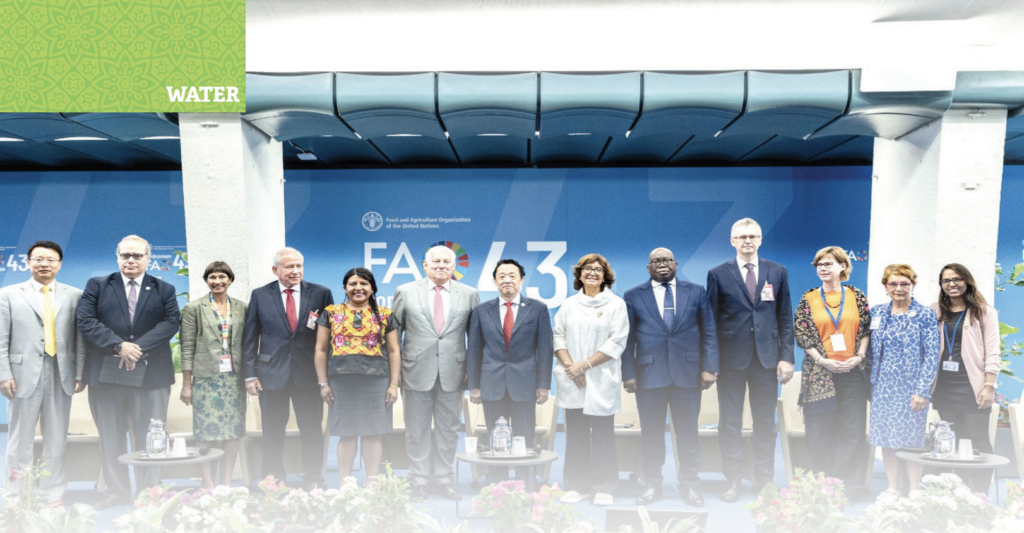By Murimi Gitari
More than three billion people live in agricultural areas with high – or very high – levels of water shortages or scarcity, and it is estimated that by 2050, 57 per cent of the global population will live in areas that suffer from water scarcity for at least one month each year
The increased pressure on water resources and related stress can deepen already severely unequal access to water, increasing existing social disparities, and particularly affecting vulnerable groups such as women, small-scale farmers and indigenous people.
With agriculture accounting for the consumption of 70 per cent of the world’s freshwater resources, agri-food systems are therefore central to addressing the scarcity we are facing. The newly re-elected FAO Director-General QU Dongyu opened the first roundtable, entitled Water Scarcity: Making Water Flow for People and Planet.
In his opening remarks, the FAO Director-General said while there may not be simple solutions to complex problems, there are “smart choices” to be made. He urged the panel to focus on better governance, more integrated water resources, and more investments.
The roundtable, which was moderated by FAO Chief Economist Maximo Torero Cullen,
also saw contributions from a high-level ministerial panel that included representatives from Brazil, Cabo Verde, China, Jordan, the Netherlands, Tajikistan, and the United States.
Among the attendees, the representative from Namibia, which is highly impacted by the climate crisis, said the main message from the debate was the need to “act now.”
Gambia’s representative said the issue disproportionately affects women, who play a leading role in the country’s agricultural sector, while Argentina’s representative pointed to the difficulties involved in finding global solutions when countries have different types of governance within their national borders.
Flood management
Floods have affected more than two billion people worldwide over the past decades and caused global losses worth around $20 billion in 2021.
In Africa, more than 2,000 people died last year alone in floods that hit around a dozen countries. In Pakistan, that same year, a flood put one-third of the country under water, leading to eight million displaced persons and more than 1,700 lives lost – one-third of them children.
Mr Dongyu kick-started the debate by calling for the need to work “with natural water processes, rather than against them.” Government ministers from several countries, including Finland, Thailand and Zimbabwe, took to the floor to share their experiences during the roundtable, which was moderated by FAO Deputy Director-General Maria Helena Semedo.
South African Agriculture minister Angela Thoko Didiza stressed the importance of civic education, early warning systems and rural and urban planning. Her Yemeni counterpart Salem Abdullah Eissa Salem Al-Socatri noted the limited availability of early warning systems in his country.
Zimbabwean Agriculture and Lands minister Anxious Jongwe Masuka said his country was working on better alerts to the population, while Finnish Agriculture and Forestry PS Jaana Husu-Kallio said her country was piloting digital flood management plans.
Water infrastructure
The roundtable on Water Infrastructure provided FAO members with an opportunity to build a shared understanding of the importance of water infrastructure in achieving the Sustainable Development Goals, share their experiences, needs and challenges in developing and managing water infrastructure, and discuss strategies, financing, investment and governance of water infrastructure for meeting current and future needs and adapting to climate change.
Reliable water supply infrastructure enables farmers to diversify their agricultural practices and crop varieties and increase resilience. Effective water storage infrastructure can help manage water resources during periods of excess and scarcity and enables farmers to cultivate crops throughout the year, mitigating the impact of seasonal variations and climate hazards. With water infrastructure critical to efforts to make agri-food systems more efficient, inclusive, resilient and sustainable, “we need to invest in infrastructure that is better suited to the water challenges we face today,” said Mr QU Dongyu.

